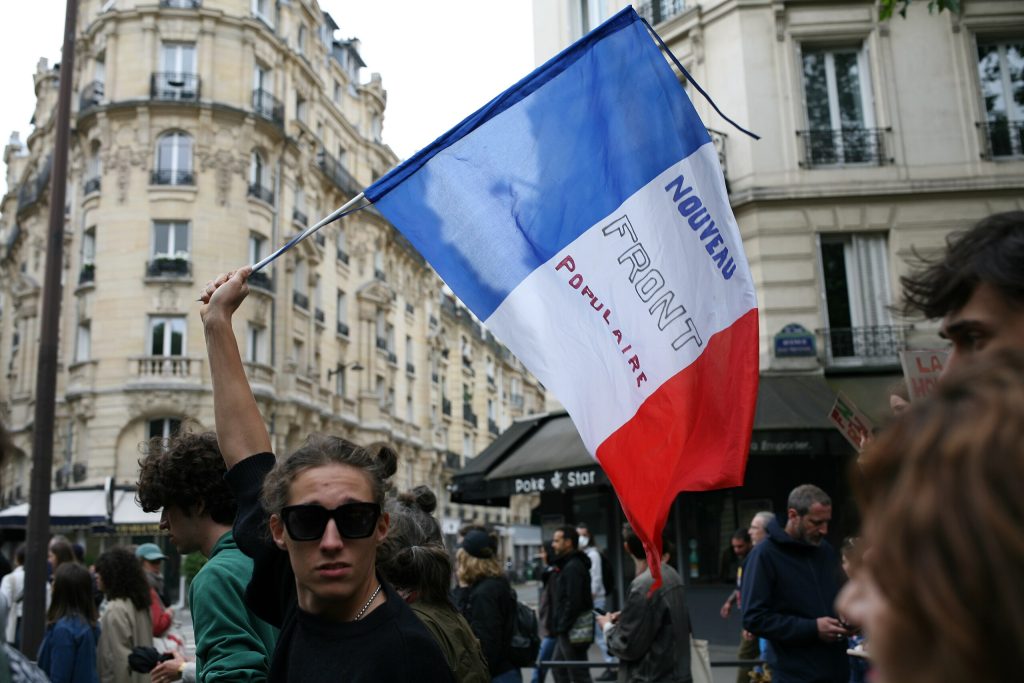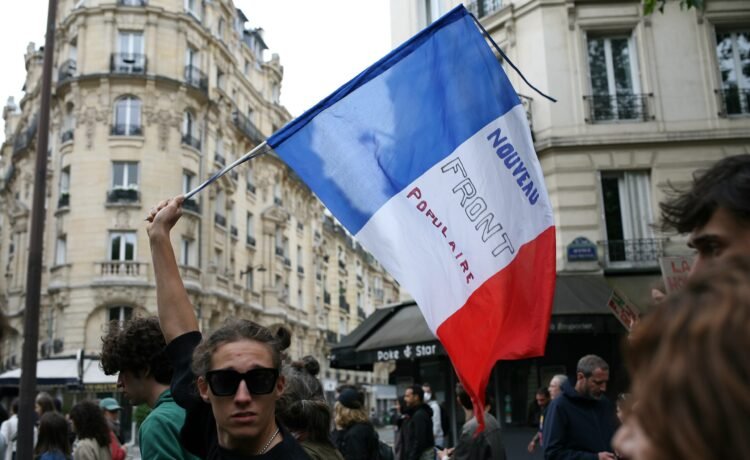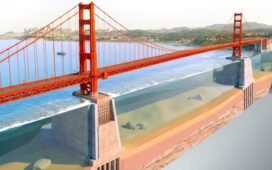In June 2024, after European elections that were a clear rejection of his party Renaissance, French President Emmanuel Macron dissolved the National Assembly in an act that only cemented his defeat. The centrist coalition Ensemble, in which Renaissance is the biggest group, had previously formed the largest faction with 250 seats; now it had only 166. The leftwing coalition New Popular Front (NFP, formerly NUPES), went from 151 to 193. The rightwing National Rally (RN) and allies made even bigger gains, going from 89 to 142. The RN alone won 126 seats, placing it as the leading parliamentary party in France.
Dissatisfied with the results, Macron waited two full months before appointing a prime minister from the centre right, Michel Barnier, who had skilfully negotiated Brexit on the side of the EU. His government lasted three months. Then, in December, Macron appointed the centrist François Bayrou, who reportedly prevailed by threatening to withdraw the support of his parliamentary group for Macron’s party.
The political environment in France has therefore been grim for over a year. Even though the President’s control over internal political events grows smaller by the day, he could again dissolve the National Assembly, a decision that could lead to the National Rally obtaining a majority and demanding that one of their own be named prime minister.
Conflicting orders from the government and the presidency have brought the state machinery to a standstill. The response to the unrest in New Caledonia, when the president ignored the minister responsible (Manuel Valls), was paradigmatic of this situation. The Ministry of Foreign Affairs moves to a rhythm set by press releases from the Élysée Palace. Some ministers go even further, making outrageous statements far outside their ministerial powers and in contradiction to the actions of the ministers responsible.

Paris, 15 June 2024. Author: Jeanne Menjoulet / source: Wikimedia Commons
Since January the National Assembly has approved only one law – on the right to die with dignity (and even that is incomplete). There have been missed opportunities and absurd decisions, particularly on matters of ecology. Rather than acting, the political class fluctuates between pessimism and prudence, preferring to wait for the municipal elections in 2026 and the presidential elections in 2027. According to a poll, constituents see their MPs as ‘far removed’ and believe that ‘there is nothing to hope’ from them anymore. The mood of the French people ‘swings between doubt, indifference and rage’, the predominant feeling being ‘that the country is ungovernable’.
The failure of the parties
Some would say that this situation is solely due to Macron. This interpretation is not entirely false. The president’s arrogance – and especially his ‘you understand nothing’ response to critics – has little of the ‘cold gaze’ that Max Weber once considered essential in a politician. Macron has become increasingly isolated, deserted by many of his close friends and followers. Some have left for careers in the private sector, disregarding any sense of public loyalty, not to mention conflicts of interest; others have been conveniently reshuffled. Some, like his former prime ministers Édouard Philippe and Gabriel Attal, have been unceremoniously cut loose. Revelations from intellectuals disappointed by Macron have become an established genre.
Yet despite Macron’s failings, we have to ask more generally about the responsibilities of the political class, particularly parliamentarians and the parties they represent. The survey points previously mentioned locates the moment at which the disconnect between the French people and the political class occurred in the long period of indecisiveness that followed the announcement of the election results.
Grouped together in an improvised alliance, the Left finished in the lead without achieving an absolute majority. They then demanded, not without grounds, that a member of their ranks be appointed prime minister to take charge of forming a government. But contrary to all democratic traditions, the president decreed that the Olympic break did not allow for appointment of a prime minister able to form a government capable of obtaining the consent of a majority of parliamentarians.
The position of the NFP was defined by the stridency of France Unbowed (France Insoumise, FI), which demanded that, as the largest party in the coalition, the prime minister should come from its own ranks and the only government program that could be implemented was that of the NFP. In so doing, FI made two mistakes. The first was to forget that the party which emerged strongest after the elections was the National Rally, led by Marine Le Pen; the second mistake, more serious still, was to think that, without a majority, the NFP had the right to form a government without reaching any agreement with other republican forces. Once again, the far left chose to participate in a game of voluntary servitude to Jean-Luc Mélenchon, who sees himself as a head controlling a large body, in the style of the tyrant described by Étienne de la Boétie in 1577.
With few exceptions, no one from any of the other parties in the NFP were able to remind Mélenchon of political realities. Nor was the NFP able to take advantage of the parenthesis provided by the Olympics to start a dialogue with other parties. It could have tried to restart the debate on a number of controversial but essential issues, such as the unpopular pension reform, the financing of the energy transition, or the reforms of the judiciary and education. As the French constitution states, it was not for the parties in the NFP to propose a government. But they could have shown that there were responsible politicians on the left, ones more concerned about the interests of the country than with their results in the opinion polls.
This would also have been a way of countering Macron’s Bonapartism. For elected representatives from Renaissance were equally irresponsible. Unlike politicians in many other European democracies, they were equally incapable of compromise. The culture of servility within the presidential party was just as bad as what prevails in France Unbowed.
As for the centre right, the few sensible voices were imperceptible. While the majority of Republican MPs rejected the decision of their former president, Éric Ciotti, to join the National Rally, they continued to methodically pick up talking points preferred by the extreme right. Several of the leaders of The Republicans continue to defend climate change denial. The same goes for xenophobic and anti-immigrant discourses, without considering the essential role that immigrants play in the French production system, from construction to the functioning of hospitals and care services. The comment of the Minister of the Interior, Bruno Retailleau, that ‘the rule of law is sacred’, was proof of this anti-democratic and harmful tendency.
When it comes to the National Rally, a party of totalitarian verticality and corruption, it is useless to think it has something intelligent to contribute to public debate. Its pseudo-nationalism is nothing but a mix of abject hatred toward immigrants and servitude to the new imperial powers of Xi Jinping’s China, Putin’s Russia and Trump’s United States.
Why are the parties in a state of such intellectual weakness and irresponsibility when faced with their leaders’ mistakes? This goes not just for party members’ failure to denounce their leaders’ dishonesty and verbal escalations, but also for their way of sticking their head in the sand when it comes to their parties’ dysfunctions. Take the witch hunt orchestrated within the Green Party against Julien Bayou because of sordid internal struggles; the repeated allegations of sexual assault against Jean-Vincent Placé, member of the same party; the entertainment expenses of Laurent Wauquiez (The Republicans) in the Rhône-Alpes region; the trips to the south of Ana Hidalgo, the mayor of Paris; the excessive salary of the head of communications for France Unbowed, Sophia Chikirou, who is also Mélenchon’s partner; the current Minister of Culture Rachida Dati’s failure to declare her wealth to the tax authorities; or, last but not least, the various financial misappropriations of National Rally that are causing trouble for its president, Marine Le Pen.
Career politics
How have French politics managed to veer off course so dramatically? The example of the Socialist Party is illustrative of a dynamic that is happening across the political spectrum. Once an organization of the masses, the party has been reduced to the bare minimum with few social roots. While its membership has begun to rise again, they are nowhere near those of just over a decade or so. Of its 47,000 members, only around 25,000 voted for the party’s general secretary at the 2025 party congress; around 40% of those votes came from party officials. Voting at the Greens convention was even lower. As political scientist Rémi Lefebvre points out, ‘the fate of the left is defined within small starving party apparatuses, much to the dismay of impotent voters’. But with the exception of the RN, the same observations could be made about almost all the other parties, where traditional activism is in decline and decisions are made in equally reduced conclaves.
Parties no longer hand out pamphlets at markets, in shopping malls, on public transport, at the entrance to workplaces, going door to door, except on special occasions during presidential elections. National and international politics are no longer debated in sections or cells; instead, slick slogans or ingenious phrases are exchanged on social media. Ritual predominates over real political activity. Being an activist has become a professional project, in which one is the parliamentary aide of an elected representative or an employee of an organisation close to the party.
Here we enter the framework described by Max Weber and Moisei Ostrogorski on the professionalization of politics, in which bureaucratically organized party machines ruin independent political actors or amateurs, with the paradox that they become ever smaller and more hierarchized. Parties operate according to the most brutal management mode, in which everyone is exploitable and exchangeable. Those who enter this world seek the prestige linked to politics, of placing ‘their hand on the wheel of history’ in Max Weber’s words, and the possibility to secure their material future.
An examination of the career paths of the most prominent politicians is revealing. Almost all have higher education: bachelor’s degrees in human sciences, graduates from Sciences Po and business or management schools, much more rarely with a hard sciences background. They rarely have experience in the world of work, except for during short summer jobs. Those who get jobs as parliamentary aides usually start by compiling files or reports. Gabriel Attal, the general secretary of Renaissance and a former prime minister, is a prime example of this career path: Sciences Po, editor of reports for Dominique Strauss-Kahn and then, after the latter’s political downfall, aide to another baron of the Socialist Party, until he became part of Macron’s talent pool. With rare exceptions, the MPs of France Unbowed and their aides have similar career paths. The same is true of the other parties, although former students of business and management schools are more numerous on the right than on the left.
Former students of Sciences Po often like to say that they have ‘studied the sciences of selling smoke’. The expression hits the nail on the head. They know which topics are in vogue and know how to speak confidently on multiple issues of which they have only a superficial grasp. If they have had experience in countries besides France, it has been during student exchanges that last no more than a few months. This means that these people are disconnected from the rest of the country, have very conventional ideas and little curiosity or intellectual inventiveness.
Some honest and responsible parliamentarians admit their difficulties in the face of international issues they do not understand deeply, or, during debates on health or bioethics, which are impossible to judge without a minimum of knowledge. And while there are civil servants with working-class backgrounds, they have had to pretend to rise above them. The only party that for the moment escapes this sociology is the National Rally, which tries to attract senior officials to lend itself an aura of respectability and competence, beyond the diatribes and ignorance of the issues that its former president has made her specialty. All these phenomena turn the parties and the political class not into organizations whose members cultivate a taste for Weberian reflection and a ‘cold gaze’, but into machines in which individuals blindly follow leaders to gain jobs and prestige.
The French are concerned about their future, and rightly so. The idea is becoming ever more entrenched that to rely on elected representatives to lead political life is suicidal. Citizens will have to become more active to influence the life of the parties and their programs.
The Spanish version of this article is published in Letras Libres.















